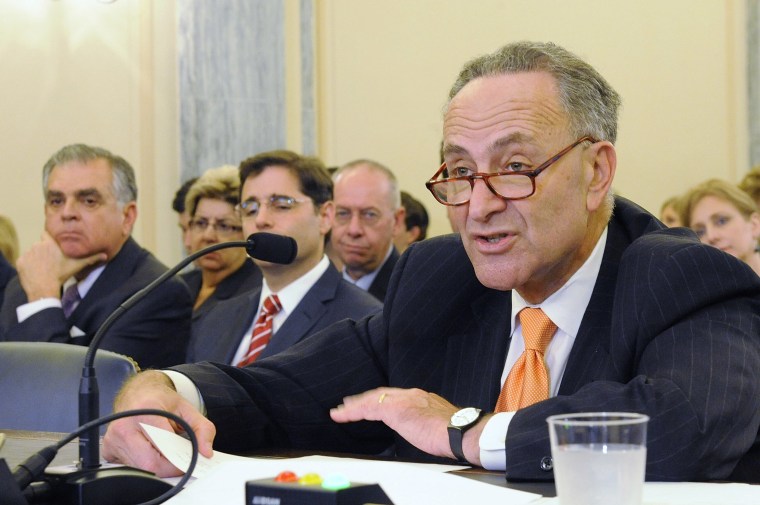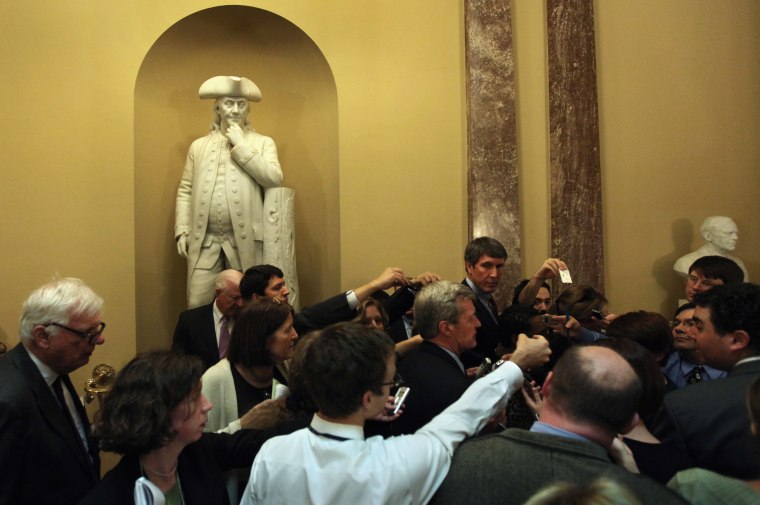The White House, key senators and media representatives have reached a compromise on legislation to protect reporters from being forced to disclose their confidential sources in federal court.
Senate supporters of the so-called media shield bill said Friday that the deal gives the government authority to override those rights in certain national security cases.
Sen. Charles Schumer, D-N.Y., said the agreement "strikes the right balance between national security concerns and the public's right to know." He said it would preserve a strong defense for reporters trying to protect sources while making sure the government can do its job of protecting citizens.
The Senate Judiciary Committee could take up the altered legislation next week.
Lucy Dalglish, executive director of the Reporters Committee for Freedom of the Press and a member of the media team involved in the negotiations, said that they were strongly recommending that the larger media coalition backing reporter protections endorse the agreement/
"I think it is a compromise we can live with and it seems to be a compromise the White House can live with. It's certainly better than the status quo," Dalglish said.
The House passed its version of a media shield bill last March, but the measure has stalled in the Senate and took a step back last month when the administration unexpectedly sought to broaden government authority to compel testimony. Dalglish said that approach was "quite honestly a slap in the face."
Schumer met with Attorney General Eric Holder last month to try to find common ground, Schumer's office said.
The original bill centered on the idea that a balancing test should be applied under which a federal judge would weigh the public's right to know versus national security claims made by the government. The administration wanted to eliminate that balancing test in many cases involving terrorism and other security cases.
Under the compromise, the balancing test would be eliminated in classified leak cases where the government can show that disclosure of a source's identity is necessary to prevent or mitigate an act of terrorism or substantial harm to national security. But the government would also have to provide specific facts: it could not make a national security claim and then withhold most of the details.
The balancing test would be in order for cases not involving classified leaks, but in criminal cases the burden would be on the journalist to show clear and convincing evidence that guarding the anonymity of sources is in the public interest.

In non-criminal cases the government would bear the burden in proving that compelling the divulging of a confidential source outweighs the public interest in newsgathering.
"The negotiated compromise creates a fair standard to protect the public interest, journalists, the news media, bloggers, prosecutors and litigants," said Sen. Arlen Specter, D-Pa., a co-sponsor of the Free Flow of Information Act.
The revised bill would also extend protections for freelance or citizen journalists by defining a journalist by the nature of activity engaged in rather than by the organization that employs the reporter.
Protections in the bill apply not only to information held directly by reporters, but also to reporter information such as phone and e-mail records held by third-party service providers.
White House spokesman Ben LaBolt said the Obama administration was the first in history to support media shield legislation and that the compromise was one the White House, Senate sponsors Schumer and Specter and a broad-based media coalition support. "We expect this proposal to move forward with bipartisan support, and the president looks forward to signing it into law," LaBolt said.
Media shield legislation has been supported by more than 70 journalism organizations including The Associated Press. It would apply only to federal courts and leave intact state protections for journalists and their sources.
